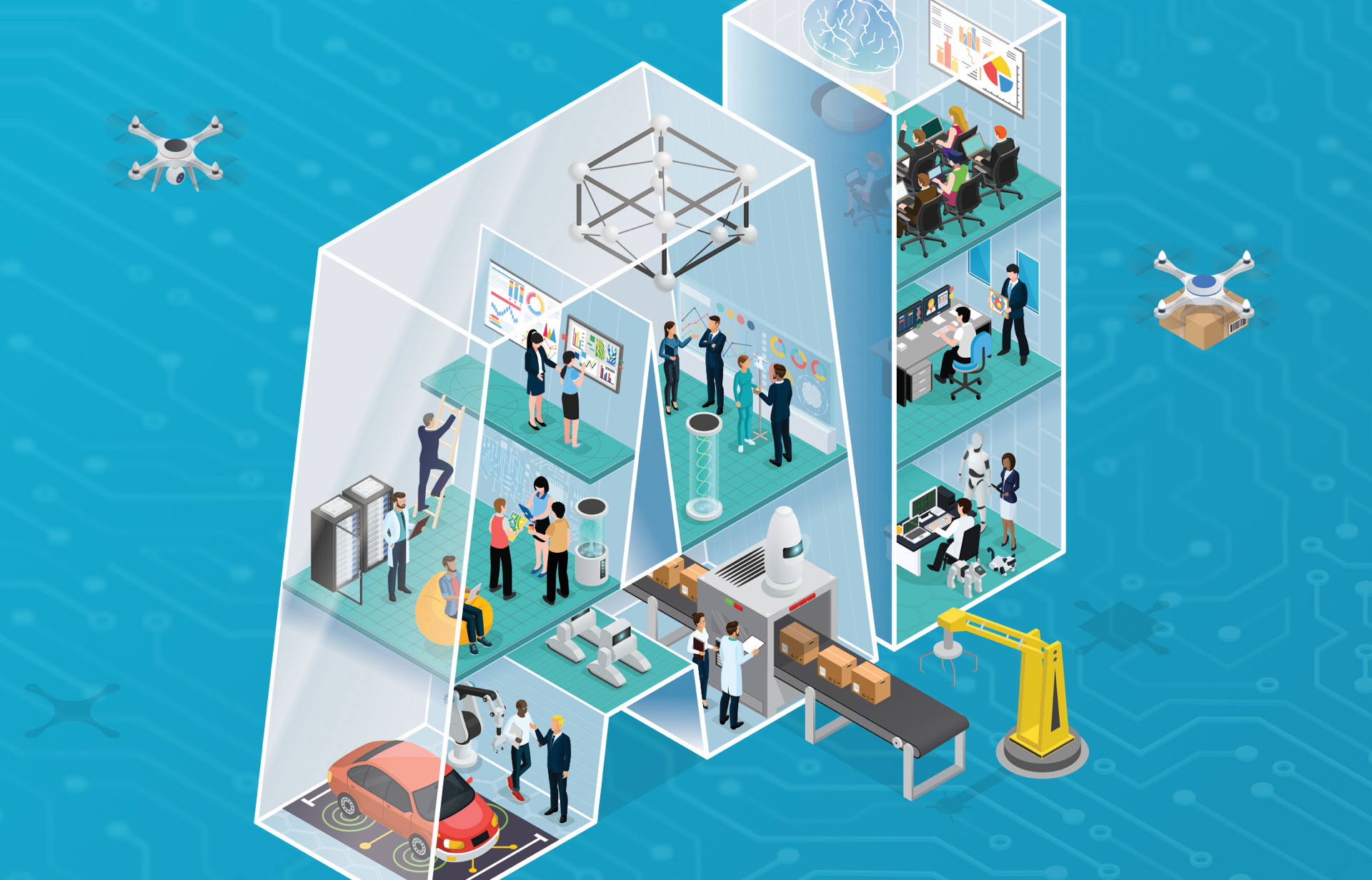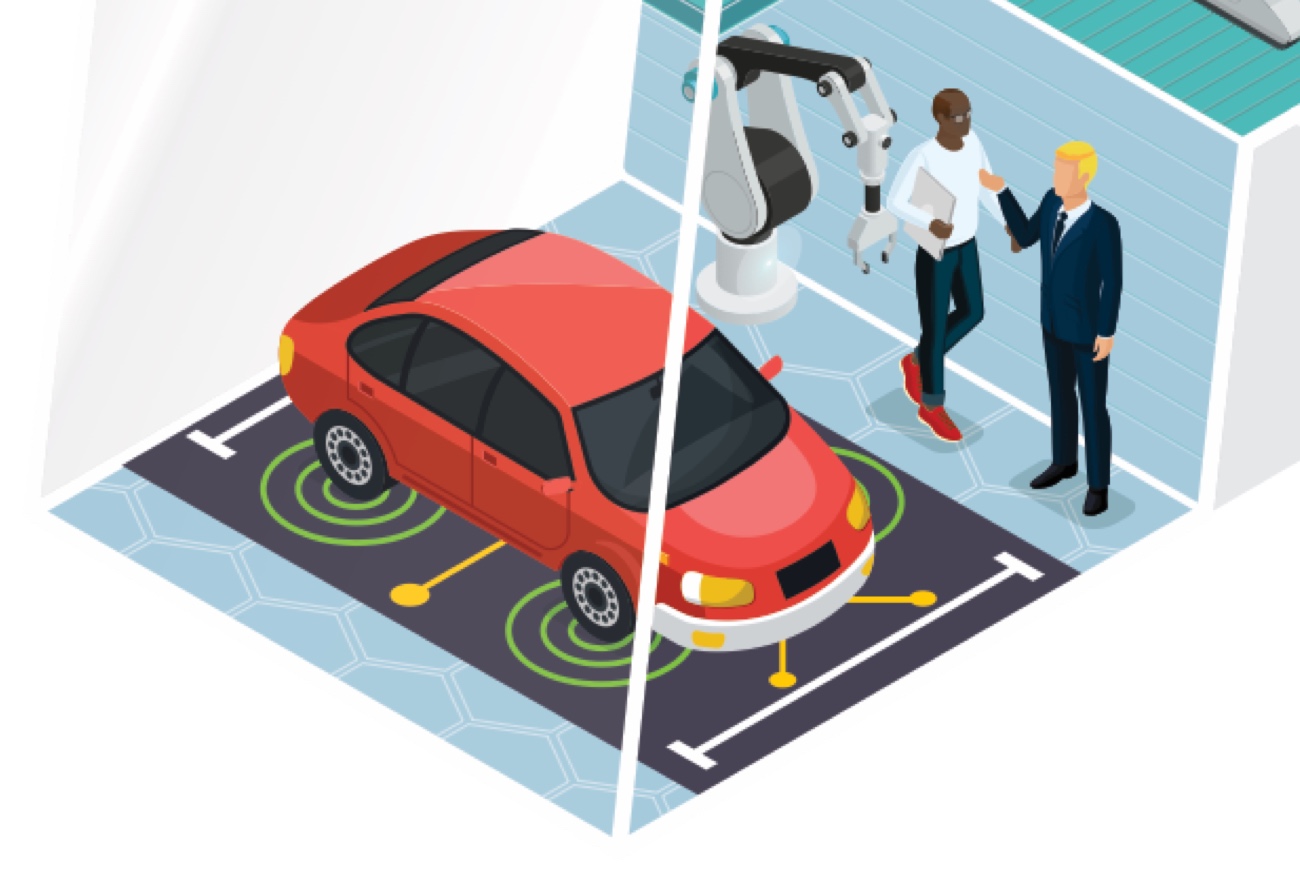The AI Manager

For robots, now is a good time to be in the job market. Across organizations everywhere, positions for the R2-D2 set are opening.
Well, not exactly. It’s not robots per se in which companies are investing. Rather, it’s artificial intelligence (AI).
The global AI market is expected to grow to US$190.61 billion by 2025 from $21.46 billion this year (up 36.62 per cent CAGR) according to research firm Markets and Markets. Just as computers in the 1980s brought us the information age, it is predicted that AI will lead to a new industrial revolution in which economies, companies, and the way we work will be utterly transformed.
“There’s no doubt that artificial intelligence is a game-changer. Every single industry will be affected,” says Steve Thomas, Assistant Professor at Smith and Director of the Queen’s Master of Management Analytics (MMA) program.
AI will automate many repetitive tasks now done by people. It will boost efficiencies, increase revenue and reduce costs. In a perfect AI world, customer service will improve thanks to, among other things, chatbots that can answer most questions. In the financial sector, loan applications that can take days to approve will be done in minutes. In healthcare, AI will quickly read CT scans to detect cancer.
But no matter how intelligent AI is, it is still, well… artificial. As a result, humans will need to be in charge. That, says Steve, will require new types of managers who understand how AI works, how best to deploy it, and how to translate what it can do — and what it can’t — throughout organizations.
For now, a shortage of such talent exists. A survey of global senior executives by PwC found that 54 per cent of companies are making big investments in AI, but only 20 per cent believe their organization has the necessary skills to succeed. A survey of Canadian executives by McKinsey found lots of interest in AI: 87 per cent said they will up their investment. But McKinsey also found a lack of understanding among leaders of AI’s capabilities and how it fits into corporate strategy.
To address the need for managers with AI expertise, Smith has launched the Queen’s Master of Management in Artificial Intelligence (MMAI) program, the first graduate business degree in AI in North America. Steve, who is the MMAI’s inaugural director, says the program is designed specifically for studying the application of AI and machine learning in business decision-making. He notes a current popular saying applicable to the program’s launch: “AI won’t replace managers, but managers who use AI will replace managers who don’t.”

Despite the current media hype, artificial intelligence is not new. It dates to the 1950s. But slow computers, among other factors, stalled progress for decades. Now, a perfect storm of super-fast computing power and cheap data storage is making artificial intelligence not just practical but useful.
So what is artificial intelligence? In a nutshell, it’s the ability of machines to exhibit intelligent human-like behaviour to solve problems or make predictions without the hard-coded software that computers need to do anything. AI is often mentioned in the same breath as machine learning and deep learning. Both are subsets of AI. Machine learning uses statistical methods to learn from data; deep learning uses neural networks modelled after the human brain.

Businesses are already finding uses for AI. Take marketing’s shift to programmatic advertising. Digital ad buys done automatically can achieve better results without human intervention. “AI allows for real-time channel optimization tailored for each customer, which not only increases click-through and conversion rates, but also increases the efficiency of the whole campaign,” says Ceren Kolsarici, Associate Professor at Smith, whose research specializes in marketing analytics.
Inevitably, AI will change the way people work. In sales, artificial intelligence is taking over parts of labour-intensive jobs such as lead generation and scoring, activity planning, customer research, scheduling and general administration, says Jim Hamilton, Lecturer at Smith, who teaches about marketing strategy, sales and sales management. With AI, salespeople are increasingly able to allocate more of their time helping buyers with a more personalized and customized approach, Jim says. Sales managers, meanwhile, can offload more of their paperwork to AI and focus on high-impact people-management activities, like coaching.
Much the same will occur in marketing, says Ceren. With laborious tasks handled by AI, managers will be able to devote more time to creative thinking, strategic planning, mentoring and collaboration — “none of which can be replaced by machines,” she says.

Like all big technological changes, AI will cause disruption. Some jobs — mostly those with highly repetitive tasks — will disappear; others will be created. One of the latter is managers capable of understanding AI and overseeing it.
Yuri Levin, Executive Director of Analytics at Smith, says that, to be successful, AI managers need to understand both the technical and business sides of artificial intelligence. A critical third skill is the ability to communicate to a company’s leadership on how best to use AI. “All three skills are equally important,” he says.
Steve Thomas believes companies will need to “build their AI bench strength by ensuring their structures, knowledge base, workforce makeup, and processes are able to make the most of AI.” In addition to technical experts on staff — such as data engineers, data analysts and technical architects — companies will require managers “who know what each of the data people are talking about and what they do on a day-to-day basis. They’ll also have the business skills to interact with upper-level management, to translate the business strategy to the data side.”
Smith’s new MMAI program aims to fill that talent gap. Announced in February (with classes starting in September), the 12-month MMAI program is based at SmithToronto and allows students to continue to work while they study. Content will be delivered by Smith faculty and adjunct faculty from the Vector Institute for Artificial Intelligence, a hub focused on research in deep learning and machine learning.
Steve says the program was designed in close collaboration with industry to ensure graduates are able to meet business needs. Its creation was the result of a meeting last fall with members of Smith’s Master of Management Analytics program advisory board. “They told us that companies are investing in AI and they need people with management skills in that area,” Steve says.
Among other things, the MMAI program will teach technical principles of AI and how to apply it to real-world problems, share expertise in business practices to use AI and machine learning, and teach how to identify opportunities to apply AI. The program will also teach skills such as communicating AI solutions across organizations and how to run high-performance work teams.

With its increasing importance across industries, AI is naturally finding its way into business schools overall. AI is more generally taught in the Queen’s Master of Management Analytics program. AI education is also being embedded into other Smith programs as well. For example, a class on AI is available in Queen’s Master of Finance. Jon Aikman, a lecturer who teaches the class, says AI’s “far-reaching implications and profound impact” requires business leaders today to clearly understand it. “The story for the next 20 or 30 years is how are we going to apply this technology.”
AI-related research is also underway at Smith through the school’s Scotiabank Centre for Customer Analytics, where machine-learning approaches and deep learning are employed to solve business problems, says Yuri Levin. “In particular, we are working with industry partners for customer analytics in financial services. But successes there can have broad implications in other management contexts; for example, human resources management, education and healthcare.”

A less life-and-death example might be loan giving. AI can be used to screen the creditworthiness of people looking to borrow money. Presumably, a machine’s decisions on who to loan money to will be free of human biases. But AI requires data to train it, and the data humans input can unwittingly affect outcomes.
One researcher at Smith looking into the ethics issue is Stephanie Kelley, a PhD candidate in management analytics. Working with Yuri Levin and Dean David Saunders, Stephanie is examining the ethical implications of AI in the financial services sector, with the goal being to provide preliminary recommendations on how the industry might handle the ethics of AI.
One key issue, she notes, is responsibility. When something goes wrong, who within a company is responsible: the business unit that requested the AI model, the computer scientist behind it, or the team manager? “Organizations will need to proactively determine how to manage questions of responsibility to protect their customers and employees,” she says.
Ethics is an important subject that will be taught in Smith’s new Master of Management in Artificial Intelligence program and is essential for AI managers to understand. Says Dean McKeown: “With AI and leadership, judgment will be vital. A lot of companies are going to be competing to stay ahead. But just because you can do something doesn’t always mean you should. The ethics around AI will be important to understand
going forward.”
- 1 of 2
- ›




